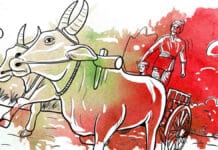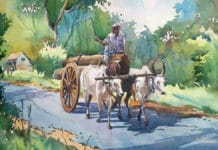Belonging to the period of pre-independence, Sarojini Naidu attracted the younger generation of India through her genuine verse. Her poems tell us of her fantasies and longings, her memory, her moments of joy and the moments of sorrow in her thought-provoking poems. She emphasized the decaying of life and the importance of fortune, the real purpose of life and the mystery of death. She sees the beauty of life and captures versatile subject matters in her poetry, although her poetic output is not so bulky.
The important theme of Sarojini Naidu’s poetry is a pure and intense aspiration. The hatred of tyranny the overthrow of the tyrant, the love of liberty, the regeneration of her own country are some of the most important notes which find a place in her aspiring and exciting poems. She is a true freedom fighter and her Campos and her passion for a glorious India always aspires her to compose verses full of idealistic notes and visions. She wants to fulfil all her human pangs of hunger; she is convinced that she cannot die.
Sarojini Naidu is a liberal poet because a large number of poems deal with her secular and liberal attitude. She loves all creatures of the world. In her poems, she never criticizes anyone and she appreciates both fair and foul. She conceived that all the creatures of the world are reflections of the Supreme Being. Thematically her poems fall into five categories: patriotic poems, nature poems, love poems, poems on Indian scenes and poems on life and death.
A Challenge to Fate by Sarojini Naidu is a poem on life and death, depicting the indomitability of the human soul. It teaches us that an enlightened human soul cannot be vanquished by fate. The poet expresses her heroic spirit in the poem and hurls a challenge to fate. Whatever sufferings are meted out to her, she will persist with her indomitable spirit.
In the first stanza, the poet asks fate why it is always conspiring and annoying her by thwarting her happiness, joys, and all the good things of life. She dares to call fate foolish and challenges it not to meddle with her life as it won’t succeed in its ill intentions. She warns it that its hateful schemes against her happiness won’t succeed. Though it is so much intent upon bringing her pain and despair, still she won’t bend her head down in supplication to it.
The poet defies fate by saying that it may perhaps succeed in destroying her brilliant world of light that her eyes see, still, it can’t deprive her of the memories of the joyous days of beautiful mountains and splendour of star-studded deep space that can only be seen with the eye of the mind. Fate can’t rob her of the treasures of beautiful memories.
In the third stanza poet again challenges fate by saying that it may take away from her the ability to hear the joyous blowing of winds in the valleys, the melodious sounds of life throughout the year, yet it can’t deprive her to enjoy the sound of the tempests and tossing seas. In the fourth stanza, the poet defies fate by saying that it may take away from her the power to speak articulately, yet her heart will never cease singing with the songs of melodious birds. Her emotional heart will sing songs in the spring season.
In the fifth stanza, she says the fate may stop the flow of blood in her veins with pain, or shackle her limbs with the pain, yet it won’t succeed in frightening and withholding her fearless spirit from riding on the wings of rain. Fate can’t bind her unconquerable mind, which is fearless and companion of the wind. In the last stanza, the poet declares confidently that fate may withhold hope from filling her being with new life and energy; it may snatch from her the fulfilment of her love, or shatter her most cherished dreams, yet she will continue drinking from the source of Universal joy. She makes it clear to fate that its desire to control her indomitable spirit will remain unfulfilled.
The attitude of the poet is openly scornful. Fate may deprive her of her sight, rob her of her hearing, take away from her the power of speech, cripple her with pain, yet it cannot take her joy-giving memories from her or hold captive her triumphant mind. Fate may do its worst but it cannot triumph over her. Indomitable spirit animates the poem A Challenge to Fate. That she may not be the master of her fate but the captivity of her soul, acceptance of life is defiantly expressed in the poem.





























